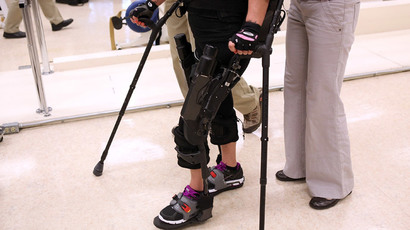Genetic discovery could boost IQ, offset brain’s decline from age and disease

A variant of a common gene already associated with heightened learning and memory could be used to offset effects of cognitive decline associated with the likes of Alzheimer’s, new research suggests.
Roughly one in five people have the genetic trait KL-VS, a variant of the “klotho” gene, according to a research team at the University of California at San Francisco (UCSF) and the Gladstone Institutes.
When the team modeled the effects in mice, they found KL-VS strengthened connections between neurons that boosted learning – or synaptic plasticity – by increasing the action of a cell receptor crucial to forming memories. KL-VS, researchers found, improved cognitive functions regardless of age by the equivalent of around six IQ points.
Scientists think the findings, published Thursday in the journal Cell Reports, will help develop tools for maintaining, and even increasing, intelligence in those who have lost some cognitive functions from either disease or aging.
"What we've discovered is a cognitive enhancer," said Dr. Dena Dubal, an assistant professor of neurology at UCSF and lead author of the new study. "This may represent a new way to treat problems of cognition in the brain."
KL-VS increases the secretion of klotho, and it may also “change the action of the protein and is known to lessen age-related cardiovascular disease and promote longevity.”
The researchers found that people who carry a single copy of the KL-VS variant of the klotho gene – about 20 percent of the population – have more klotho protein in their blood than others. Studies in the 1990s, when the variant was first discovered, found people with KL-VS often lived a few years longer than others. In animals, the effect is more profound.
Over three years, the UCSF-Gladstone team tested links between KL-VS and age-related human cognition in three separate studies using more than 700 people without dementia between the ages of 52 and 85.
“These surprising results pave a promising new avenue of research,” said Roderick Corriveau, PhD, program director at NIH’s National Institute of Neurological Disorders and Stroke (NINDS). “Although preliminary, they suggest klotho could be used to bump up cognition for people suffering from dementia.”
Scientists said older, more cognitively-deteriorated mice performed better on intelligence tests once they were engineered to produce more of the klotho hormone.
"Klotho is not dependent on aging or related to modulating the aging process - it seems to enhance or boost cognition at any age," said Dr. Lennart Mucke, director of neurological research at Gladstone, according to the San Francisco Chronicle. "If you have a condition that diminishes cognition in some way, be that in old people or in young people, it might be possible to use klotho to counteract that."
Despite its lack of protective effects – the research did not find a preventative function in KL-VS – the variant could eventually be sold as a drug to elevate klotho levels and enhance cognition for those of any age group, not just the elderly, according to The Economist.















